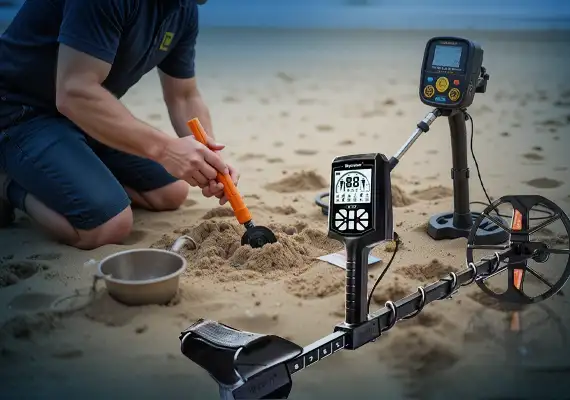
The Ultimate Guide to Metal Detectors: How They Work and Why They Matter
Introduction
Metal detectors are amazing devices that help us find hidden metal objects underground, in walls, or even on people. From treasure hunters searching for coins to security guards keeping airports safe, metal detectors play an important role in our everyday lives.
In this blog, we’ll explore what metal detectors are, how they work, and where they are used. If you’ve ever been curious about these fascinating machines, keep reading!
What Is a Metal Detector?
A metal detector is an electronic device that finds metal objects by using electromagnetic waves. When it detects metal, it gives off a signal—either a beep, a vibration, or a light—letting the user know that metal is present.
Metal detectors come in different types, including:
- Handheld metal detectors – Small, portable detectors used for security checks.
- Walk-through metal detectors – Large detectors found at airports and event entrances.
- Industrial metal detectors – Used in factories to check food, medicines, and other products for metal contamination.
- Ground-search metal detectors – Used by treasure hunters and archaeologists to find metal underground.
How Does a Metal Detector Work?
Metal detectors work by sending out electromagnetic waves. When these waves hit a metal object, they bounce back and trigger an alert. Here’s a simple breakdown:
1. The search coil emits electromagnetic waves.
2. If there’s metal nearby, it disturbs the waves.
3.The metal detector receives the signal and alerts the user.
The size of the search coil, the frequency of the waves, and the type of metal all affect how well a metal detector works. Some advanced models can even tell the difference between gold, iron, and aluminum!
The Versatile Uses of Metal Detectors in Security, Exploration, and Industry
Metal detectors are fascinating tools with a wide range of uses, making them essential in many areas of life. One of their most well-known roles is in security. You’ve probably seen them at airports, where they help screen passengers for things like knives or guns. They’re also used in places like shopping malls, sports stadiums, and concert venues to keep these spaces safe by preventing weapons from getting in.
But metal detectors aren’t just for security—they’re also a big deal in the world of treasure hunting and archaeology. Imagine combing through a beach with a metal detector, hoping to find lost jewelry or coins. Or exploring old fields, parks, and even battlefields to uncover hidden artifacts, ancient coins, or relics from wars long past. For many, it’s not just a hobby but a way to connect with history.
In the construction and industrial world, metal detectors are just as important. Construction crews use them to find hidden pipes, wires, or nails in walls or underground, which helps avoid accidents during projects. Factories also use them to check products like food, medicine, and textiles, making sure no tiny metal pieces end up where they shouldn’t.
And let’s not forget their role in prisons and law enforcement. Prison guards use metal detectors to stop inmates from sneaking in weapons, while police officers use them to search crime scenes for evidence like bullets or hidden tools.
From keeping us safe to helping us uncover hidden treasures, metal detectors are incredibly useful tools that touch many aspects of our lives. Whether you’re an adventurer, a construction worker, or a security professional, there’s a good chance a metal detector has played a part in your world.
Tips for Using a Metal Detector Effectively
If you want to get the best results from a metal detector, follow these tips:
1. Choose the right detector – Different metal detectors are designed for different tasks. A security metal detector won’t work well for treasure hunting.
2. Adjust the sensitivity – If your detector beeps too much, lower the sensitivity to avoid detecting tiny, useless metal bits.
3. Move slowly and steadily – Rushing will cause you to miss objects, so scan the area carefully.
4. Use headphones – Some detectors allow you to plug in headphones so you can hear the beeps better in noisy places.
5. Dig carefully – If you find something underground, dig gently so you don’t damage the object.
What Can a Metal Detector find?
Metal detectors can find a variety of objects, including:
- Coins and jewelry – Lost rings, necklaces, and old coins are common finds.
- Weapons – Guns, knives, and bullets are often detected in security screenings.
- Historical relics – Old war buttons, swords, and armor pieces can be found in battlefields.
- Gold and silver – Many treasure hunters look for valuable metals using special detectors.
- Electronics and wires – Some detectors can locate metal components inside walls or underground cables.
Future of Metal Detectors
Technology is always improving, and metal detectors are no exception. In the future, we can expect:
- AI-powered detectors – Machines that can tell the difference between useful and useless metal objects.
- More sensitive detectors – Devices that can detect even the smallest pieces of metal.
- Wireless and app-controlled detectors – Metal detectors that connect to your phone for easier tracking.
These advancements will make metal detecting even more exciting and useful!
Metal detectors are incredibly useful tools with a wide range of applications. Whether they’re used for security, treasure hunting, or industrial purposes, they help us find hidden metal objects quickly and efficiently.
If you’re interested in getting a metal detector, think about what you need it for—security, hobby searching, or professional use. With the right detector and some practice, you might just uncover hidden treasures or help keep your surroundings safe!
Copyright © Revenco.co Allrights reserved.